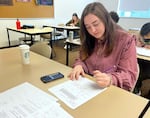
Julia Short working at Chemeketa Community College on Feb. 21, 2024. Short said her recent success in math has given her the confidence to try other difficult subjects.
Tiffany Camhi / OPB
Julia Short remembers hating mathematics throughout middle and high school. Short didn’t understand math and thought she never would.
That uncertainty and anxiety seeped into her confidence, making her feel like college wasn’t right for her. Short thought if she couldn’t understand math in high school, how would she ever make it through college?
“I was terrified to do math,” said Short. “After I graduated high school I was like, ‘There’s no way I can be successful in college.’”
But two semesters into her postsecondary education at Chemeketa Community College, the 22-year-old is doing something she thought she never could: excelling in math.
Short’s newfound success in math is partly due to a slate of old and new remedial education models that were offered to her at Chemeketa. One of them — known as corequisite education — is a model that’s gained popularity in community colleges and universities across the nation over the past several years. Now some education advocates in Oregon are looking to make corequisites a mainstay in the state’s community colleges.
For decades, higher education institutions leaned on prerequisite classes to catch up students who were deemed not ready for college-level classes. The corequisite idea flips that traditional remediation on its head: Instead of keeping students out of a challenging class and forcing them to first take one or two prerequisite courses, corequisites allow students to take those college-level courses immediately and enroll in a supportive class at the same time. The corequisite class is usually a one-credit course paired with college-level courses, often math and English.
Short chose to take a standard algebra class last semester before enrolling in her first corequisite paired classes this semester: Precalculus 1 and Corequisite Support for Precalculus 1. This means she’s taking math classes four days a week, but Short doesn’t mind it.
“With math it is so crucial to practice, practice, practice,” Short said. “That’s how you get really good at it.”
With the corequisite, she’s also saving time and money.
“If the corequisite was not offered for this course, I would have to take another class,” said Short. “So that’s gonna be about $500 I’m saving.”
Short also likes that she gets plenty of face time with her instructor, Benjamin Gort, who teaches both the corequisite and college-level precalculus courses at Chemeketa’s Yamhill Valley campus in McMinnville. Gort has been teaching corequisite math at Chemeketa since the first year the school started offering it in 2021. He was skeptical in the beginning.

Chemeketa math teacher Benjamin Gort reviews math problems with students in his corequisite class on Feb. 21, 2024. Gort has taught corequisite math since 2021.
Tiffany Camhi / OPB
“It was scary,” Gort said of Chemeketa’s corequisite pilot phase. “We were worried it could fail, the whole process could fail.”
But the opposite happened.
“It was astonishing to me,” said Gort. “Not only did they pass, they were excelling at the college-level class.”
In some of his classes, students who were required to take a corequisite were doing better than students who were placed into the college-level math course alone, Gort said.
Data from 2022 and 2023 showed Chemeketa students enrolled in corequisite math were passing college-level math at higher rates — 12 percentage points higher — than their peers who were not placed in a corequisite course.
Gort has also noticed that the corequisite model works extremely well for students who need just a little extra support to understand math concepts introduced to them earlier in their life. It’s like jogging their memory.
“It’s kind of like riding a bike,” said Gort. “You never really forget; you just have to remind yourself about some things.”
This is the case for Stephanie Shelton, another one of Gort’s students. Shelton, 56, is a small business owner, but with the volatile economy she’s looking to get into the more stable career of nursing. Shelton is in her first semester at Chemeketa and it’s been a while since she’s had to take a math class.
“Math was my kryptonite,” Shelton said.
Shelton tested just below what would have been considered ready for college-level math. So her adviser recommended she take a corequisite math course. The class was described to Shelton as a sort of study hall for the core math class she was required to take.
“I have that luxury to, without any pressure, ask my instructor, ‘Wait, I didn’t get what we talked about yesterday so can you explain that to me?’” Shelton said. “It’s really quite beneficial.”
Shelton said the corequisite has eliminated any kind of math anxiety she previously had. And so far, she has an A in the class.

Stephanie Shelton said she feels ready to take on other math courses after her success with the corequisite math class.
Tiffany Camhi / OPB
Corequisites catching on
More than half of Oregon’s 17 community colleges are already offering some form of corequisite math education in their classrooms. Elizabeth Cox Brand, director of the nonprofit community college advocacy group Oregon Student Success Center, is a driving force behind that.
Cox Brand is a big believer in corequisite education, citing studies that have shown positive results for students in states that have already adopted this form of remedial education.
“Corequisites work for a heck of a lot more people than what we’re currently doing,” said Cox Brand. “As educators, we should be constantly trying to change, adapt and get better with the research.”
A study of Tennessee’s systemwide community college switch from prerequisites to corequisites found higher rates of completion in college-level math and English classes.
Additional research has shown higher dropout rates among students enrolled in prerequisite classes, and a pattern of Black, Indigenous and people of color, as well as people who come from low-income families, being disproportionately placed into prerequisite classes.
Oregon’s Higher Education Coordinating Commission received a grant to kick-start a corequisite effort in 2020. By 2022, nine community colleges were trying them out. None of Oregon’s public universities took part in the pilot.
“I don’t even say we’re piloting anymore. We’re implementing,” said Cox Brand. “It’s just not at scale.”
Cox Brand wants to get to a point where all of Oregon’s 17 community colleges are offering a standardized corequisite model. A policy directive in state Sen. Michael Dembrow’s omnibus education bill, Senate Bill 1552, would be the first step toward that goal. If passed, the directive instructs HECC to convene a workgroup to study corequisite best practices and ways to implement and standardize the model in all of Oregon’s community colleges. The study would have to be submitted to HECC by Dec. 15, 2024.
There’s a potential opening for universities to embrace this new approach as well, particularly as the need for remedial support appears to be going up.
According to data from the National Center for Education Statistics, nearly 68% of first-year undergraduate students at four-year public institutions reported taking a remedial math class in the 2019-20 school year, which is the most recent data available. That’s a huge jump from the previously recorded 2015-16 school year, when about 14% of this group reported enrolling in a remedial math class.
Portland State University began piloting a corequisite for its Math 111 class this semester. The pilot is part of a new effort to boost student success in mathematics, called the Math Start Initiative.
Shoshana Zeisman-Pereyo, director of PSU’s student learning initiatives, said the corequisite pilot is designed to meet students where they are by looking at the skills students may be lacking as they exit high school.
“We’re really excited about the opportunity to try something that really feels like it’s on the forefront,” said Zeisman-Pereyo about corequisites. “At the same time, we’re getting ahead of what might become a growing need for our students.”

Julia Short practices combining functions in her Precalculus corequisite class on Feb. 21, 2024. The support class meets twice a week.
Tiffany Camhi / OPB
At Chemeketa Community College, instructors are very intentional about who gets placed into prerequisite and corequisite classes.
Corequisites offer a good middle ground for the many students who just need a refresher course alongside the college-level course to succeed, while prerequisites focus on foundational knowledge, said math teacher Benjamin Gort.
Gort said he’s seen another benefit of corequisites too: enrolling students in college-level courses right away cues to them that they do belong in college.
“I can tell them that they are college material. I can say that all I want,” said Gort. “But when they do well in a college-level math class, that speaks volumes to their confidence and that’s something that they earn on their own.”
That’s true for Chemeketa student Julia Short, who is now a math tutor for students in prerequisite math classes at the school. Short wants to transfer to Oregon State University and study forensic science. For that, she’ll have to take another seemingly daunting class: chemistry.
But Short says it’s not that scary now that she’s already achieved what she thought was impossible.
”To be honest, college is the first time in my life where I’ve been really successful at school,” said Short. “It’s kind of cool, very unexpected.”
